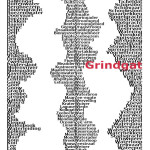While visiting Scotland I had the opportunity to discuss my work with Irene McAra and Joe Lockwood, both…
Omnipresence
Posted by Everdien on 7/03/22 • Categorized as Dutch Space is Different,PhD,Sidebar
Spent a lot of time on research this week – even started a separate blog just for notes. Interesting thing, to roam through a subject, letting myself be distracted and re-routed by what turns up. Note to self: this is time very productively spent. Another note to self: take your time.
Most productive quote is from Auke van der Woud, in chapter 7: Work in Progress, part of the publication Rekenschap: 1650-2000 by D.W. Fokkema and Frans Grijzenhout Translated by Google it goes as follows:
Page 195 – 196 After 1945 began a process that would last almost half a century, in which the democratically elected central control and collectivization of Dutch society would increase at the same time as its prosperity, to a size and finesse that would have been unimaginable before 1940. Between 1950 and 1984, national income grew from 17 to 342 billion guilders; the share of the collective sector was 32 percent in 1950, in 1984 it had become 70 percent. During that period, the size of public administration, of the civil service and of the rules and regulations increased proportionately.
Under the leadership of this powerful and almost omnipresent government, the Netherlands has completely changed its appearance in the second half of the century. Especially as a result of a precedentless (general Western) popular welfare, which now created on a national scale – that is, everywhere in the Netherlands – the spatially favorable and problematic conditions that were only created a century ago in the big cities: mass housing, mass mobility, mass production, mass consumption, mass recreation and culture, with congestion, stagnation, pollution and nuisance on an equally large national scale.
Page 196 The difference between this post-war planning and the practice of ‘making’ the country in the centuries before that is very big. Previously, land was made, landscapes were changed to increase prosperity, which often meant little more than that the makers could guarantee themselves a fairly stable minimum subsistence level. The planning of the period after 1960 – with an appeal to statistical collections and forecasts – began to regard the future in general as ‘makeable’. The future – a domain of existence that for centuries man did not consider himself competent in, and spoke of with trepidation – in the decades after 1960 became a subject for which the government assumed responsibility on behalf of all citizens.
Gerelateerd:
-
Dutch Space is Different
-
Limitless
http://everdienbreken.org/Eemland/2024/02/29/grenzeloos/ I embedded a link to my Eemland blog, where I just spent time sorting…







